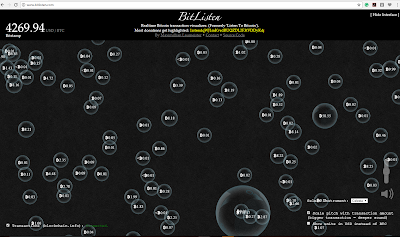Translate
Friday, 6 October 2017
Wednesday, 4 October 2017
Saturday, 16 September 2017
Bisq - Decentralised Bitcoin Exchange
We have a decentralised exchange. now we just need more people to use it. Bisq is pretty awesome, the programme works well, looks nice and is free to download on your computer. It's even developed in a decentralised way.
Crypto Girls that Rock
Cryptopunks aren't like that. I've been wanting to post props for these girls for a while.
So here are some internet links to some people I think are doing good work,
Julia Toaranski, video blogger, and anarchist
Meltem Demirors, Digital currency guru
Amanda B. Johnson the Dash "Daily Decrypt" girl
and
Marguerite deCourcelle the for pink coin. They are running a crypto fundraiser for Hurricane Irma and a whole lot of other things Its actually and complete charity platform. Better get on and donate.
Even though most of us are nerds behind computers there are some of us who are cool. Please post any I've missed below.
Segwit is in but 2x is not.
I started writing this piece before the Bcash fork and at the time I was positive about the Segwit2x compromise. Segiwit2x seemed a far better option than the BCash unlimited crowd proposed.
2mb blocks would give added quick relief for transactions and increase its practicality whilst keeping bitcoin nodes at level easy enough for anyone to run on their home computer.
Some people were up in arms about any part of increasing blocks, but with so many things lately, I think this is a bipolar sound bite like reaction. People talk about the political nature of it, as some kind of corporate take over. I am very sympathetic to this debate when it comes to block size, but I'm not fully convinced.
The fact that the signaling was agreed to by a bunch of bitcoin companies and miners behind closed doors, I think is not ideal, but I still think this represents the decentralised process that Bitcoin is founded on. Decentralisation can happen in different ways and need not always be digital.
At the time users got what they wanted with Segwit and 2mb blocks in 90 days seemed reasonable. Micro-transactions are cool and nodes are not that hard to run. Mine run on my home computer and I can still stream games and tv. I get the feeling I could probably run a node on my old cell phone. On the flip side however, when I am doing serious work on my computer even with 1mb blocks, I do not run the node as it does slow things down.
The idea of this compromise and the events that unfolded, I think, are proof that the system works politically and I think its one of the best things to happen for bitcoin yet. We could get the best of both worlds, a solid Segwit soft fork and likely a secure 2mb hard fork 90days after. This gives the ideal result for Bitcoin and provides solutions that have stood up to debate and mass technical scrutiny. As a long time enthusiast it seems like natural consensus paradise and with the price then at over $2500usd things were looking good.
In the last few weeks that optimistic thinking has proved, in typical cryptoboom fashion, not to be optimistic enough. What seemed like chaotic behaviour has proved to be very wise. Transaction fees have dropped and blocks are now remaining healthily within the segwit only size limitations. It is proving that with segwit implemented, the larger blocks of 2x will indeed not be necessary. So even the order of implementation was correct. Bitcoin has become its old antifragile self, and the value has nearly doubled since.
Further to the success of segwit, the closed-door meeting agreement is beginning to show signs of weakening. The old world legal administrative structure, which blockchain does also in part propose to solve, has shown its flaws. The traditional written contract used for the 2x compromise, stated that there would be "single chain" for the 2x implementation and many people are saying that this make it void. We now have the bitcoin fork Bcash and we have no guarantee that the 90 day 2x deal will be able to prevent a new fork when it is made. We should have known that the language of contracts is not like the math involved in our decentralised bitcoin system.
Change proponents now know that they should hard code in their changes and that closed door deals are unlikely to work. It turns out the trustless system is the only one that can be trusted.
2mb blocks would give added quick relief for transactions and increase its practicality whilst keeping bitcoin nodes at level easy enough for anyone to run on their home computer.
Some people were up in arms about any part of increasing blocks, but with so many things lately, I think this is a bipolar sound bite like reaction. People talk about the political nature of it, as some kind of corporate take over. I am very sympathetic to this debate when it comes to block size, but I'm not fully convinced.
The fact that the signaling was agreed to by a bunch of bitcoin companies and miners behind closed doors, I think is not ideal, but I still think this represents the decentralised process that Bitcoin is founded on. Decentralisation can happen in different ways and need not always be digital.
At the time users got what they wanted with Segwit and 2mb blocks in 90 days seemed reasonable. Micro-transactions are cool and nodes are not that hard to run. Mine run on my home computer and I can still stream games and tv. I get the feeling I could probably run a node on my old cell phone. On the flip side however, when I am doing serious work on my computer even with 1mb blocks, I do not run the node as it does slow things down.
The idea of this compromise and the events that unfolded, I think, are proof that the system works politically and I think its one of the best things to happen for bitcoin yet. We could get the best of both worlds, a solid Segwit soft fork and likely a secure 2mb hard fork 90days after. This gives the ideal result for Bitcoin and provides solutions that have stood up to debate and mass technical scrutiny. As a long time enthusiast it seems like natural consensus paradise and with the price then at over $2500usd things were looking good.
In the last few weeks that optimistic thinking has proved, in typical cryptoboom fashion, not to be optimistic enough. What seemed like chaotic behaviour has proved to be very wise. Transaction fees have dropped and blocks are now remaining healthily within the segwit only size limitations. It is proving that with segwit implemented, the larger blocks of 2x will indeed not be necessary. So even the order of implementation was correct. Bitcoin has become its old antifragile self, and the value has nearly doubled since.
Further to the success of segwit, the closed-door meeting agreement is beginning to show signs of weakening. The old world legal administrative structure, which blockchain does also in part propose to solve, has shown its flaws. The traditional written contract used for the 2x compromise, stated that there would be "single chain" for the 2x implementation and many people are saying that this make it void. We now have the bitcoin fork Bcash and we have no guarantee that the 90 day 2x deal will be able to prevent a new fork when it is made. We should have known that the language of contracts is not like the math involved in our decentralised bitcoin system.
Change proponents now know that they should hard code in their changes and that closed door deals are unlikely to work. It turns out the trustless system is the only one that can be trusted.
Wednesday, 6 September 2017
Nuclear Proof Money
Trace Mayer talks about how bitcoin is the only sound form of money that can not be confiscated by force. You can hold agun to someones head but if they dont give you the code, or tell you the co signatories whom hold the other parts of the multisignature then you can't get the funds. There are no profit driven third parties to comondeer, no way to intimidate pottentially anonymous holders and no way to incircle and confiscate something that doesn't have to exists anywhere but in mathematics.
The concept is a lot simpler when we consider the situation of a nuclear attack. you cant blow up bitcoin with an H bomb, but cash, banks, stocks and even property and gold can become radio active and useless. 'Hopefuly we never see this, but prepers would be wise to get there bitcoin stash and satelite phone ready.
The concept is a lot simpler when we consider the situation of a nuclear attack. you cant blow up bitcoin with an H bomb, but cash, banks, stocks and even property and gold can become radio active and useless. 'Hopefuly we never see this, but prepers would be wise to get there bitcoin stash and satelite phone ready.
Subscribe to:
Comments (Atom)





